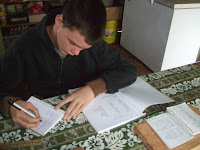 Lichinga, Mozambique
Lichinga, MozambiqueTuesday, December 8, 2009
.
Learning the Yao Language
We believe that part of being a successful missionary is learning the heart language of the people who you are ministering among. This is something we have been able to focus on lately here in Lichinga, among other things, during the rainy season. So we have been hitting the language studies.
.
The Yao language is in the Bantu language family (as is Swahili and other languages) and is a very unique language. Learning the language is more than just trying to read and say words and phrases in Yao; it is listening to the Yao people speak, and trying to use what we learn in everyday conversation with the Yao people.
.
We are so blessed to have a few resources in Yao to make learning the language easier. We have two sets of written material, one that also has mp3s along with it, so you can actually hear the Yao speaker and try to follow along. We all have notebooks that we copy this written material into by hand, and then practice speaking as we listen to the mp3s on our iPod. This has been helpful. I have also been blessed to find one out of print Yao New Testament (which I purchased from another missionary at a moving sale), that is more of the Malawi Yao, but still understandable to those here in Mozambique. I’ve been bringing my Yao Bible to the villages and just reading Scripture passages to the people who gather to hear. This helps in language learning, to be able to read it aloud.
.
Maybe you would like to learn a few simple Yao phrases with us. One greeting we often give is to say, “ntendele” which means, “peace.” To greet someone in the morning you would say to them, “Adjimwiche wudi?” which literally means, “have you passed the morning?” The response would be, “Nyimwiche, kwadi ajetu?” which literally means, “I have passed the morning, and you?” One of my favorite phrases in Yao is, “Isa akunonyela mwejo n’nope,” which means, “Jesus loves you very much.” This are just a few simple phrases. Please pray that God would give us acceleration in learning the Yao language, that we would be able to communicate to the Yao people in their heart language, pray with them, and even teach God’s word to them. Using interpreters is okay, but speaking to them in their language really opens up the doors to their hearts, and brings big smiles to their faces as white people attempt to speak their language.
.
Maybe you would like to learn a few simple Yao phrases with us. One greeting we often give is to say, “ntendele” which means, “peace.” To greet someone in the morning you would say to them, “Adjimwiche wudi?” which literally means, “have you passed the morning?” The response would be, “Nyimwiche, kwadi ajetu?” which literally means, “I have passed the morning, and you?” One of my favorite phrases in Yao is, “Isa akunonyela mwejo n’nope,” which means, “Jesus loves you very much.” This are just a few simple phrases. Please pray that God would give us acceleration in learning the Yao language, that we would be able to communicate to the Yao people in their heart language, pray with them, and even teach God’s word to them. Using interpreters is okay, but speaking to them in their language really opens up the doors to their hearts, and brings big smiles to their faces as white people attempt to speak their language.
.
Christian Young



No comments:
Post a Comment